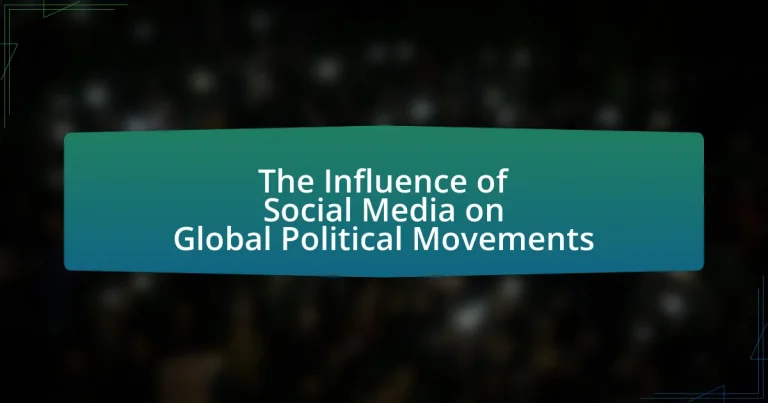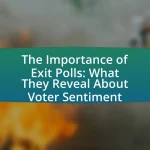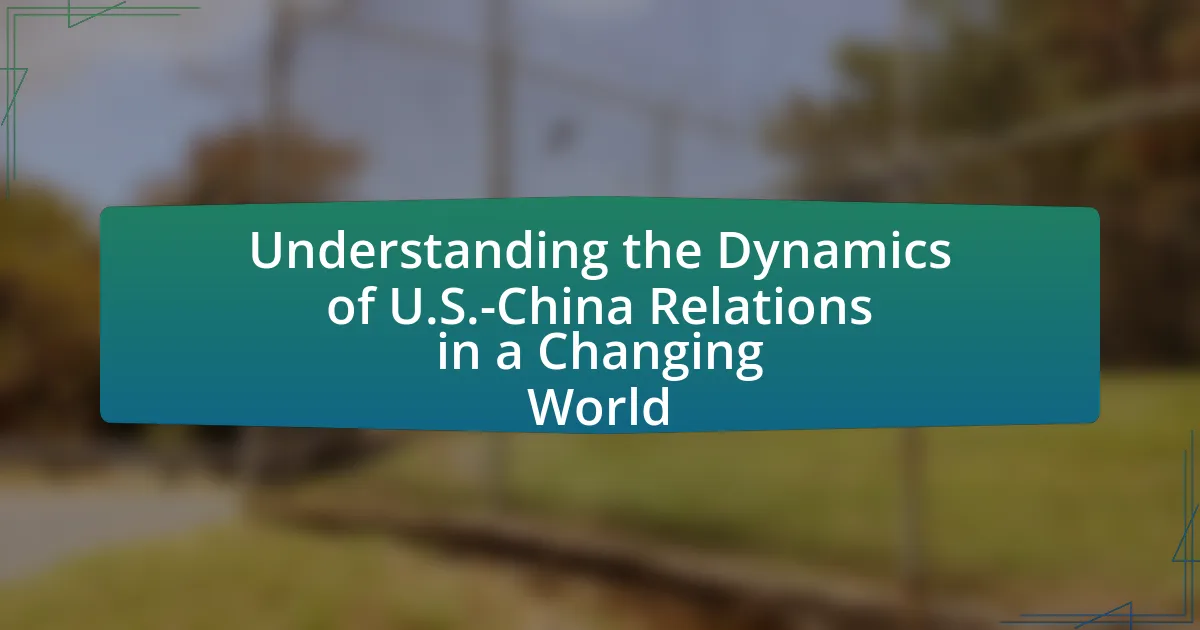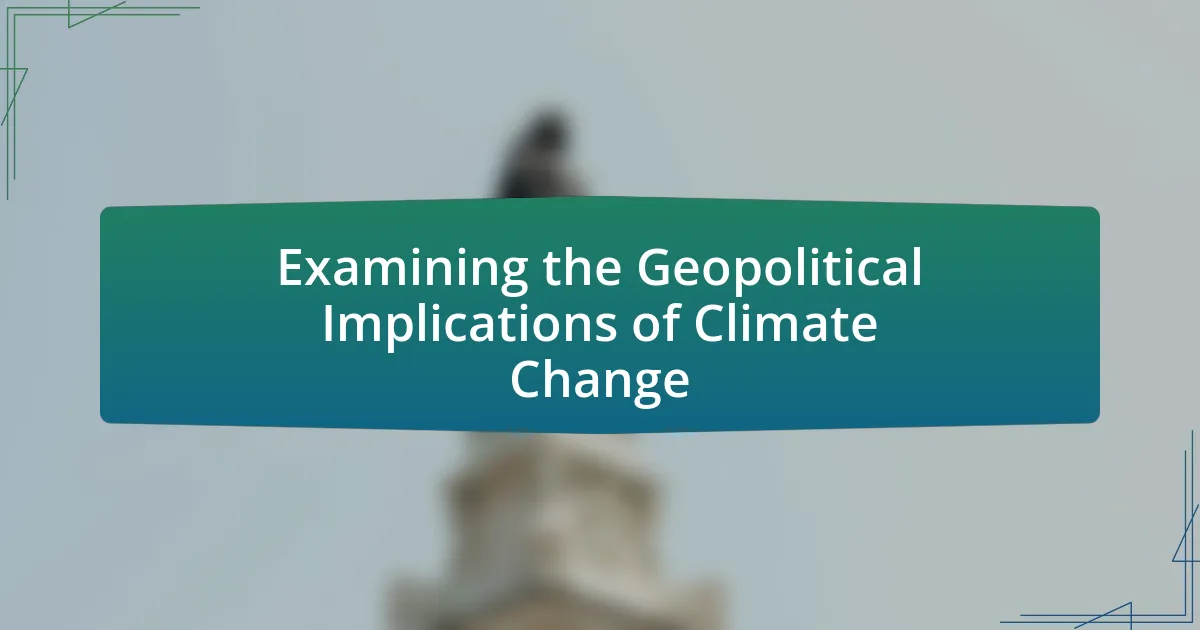The article examines the influence of social media on global political movements, highlighting its role in facilitating communication, mobilization, and organization among activists. It discusses key case studies, including the Arab Spring and the Black Lives Matter movement, illustrating how platforms like Twitter and Facebook have transformed political activism by enabling rapid information dissemination and grassroots mobilization. The article also addresses the dual nature of social media as both a tool for empowerment and a source of misinformation, emphasizing the ethical considerations and responsibilities of social media companies in moderating political content. Additionally, it explores demographic engagement with social media and the implications of emerging technologies on political discourse.
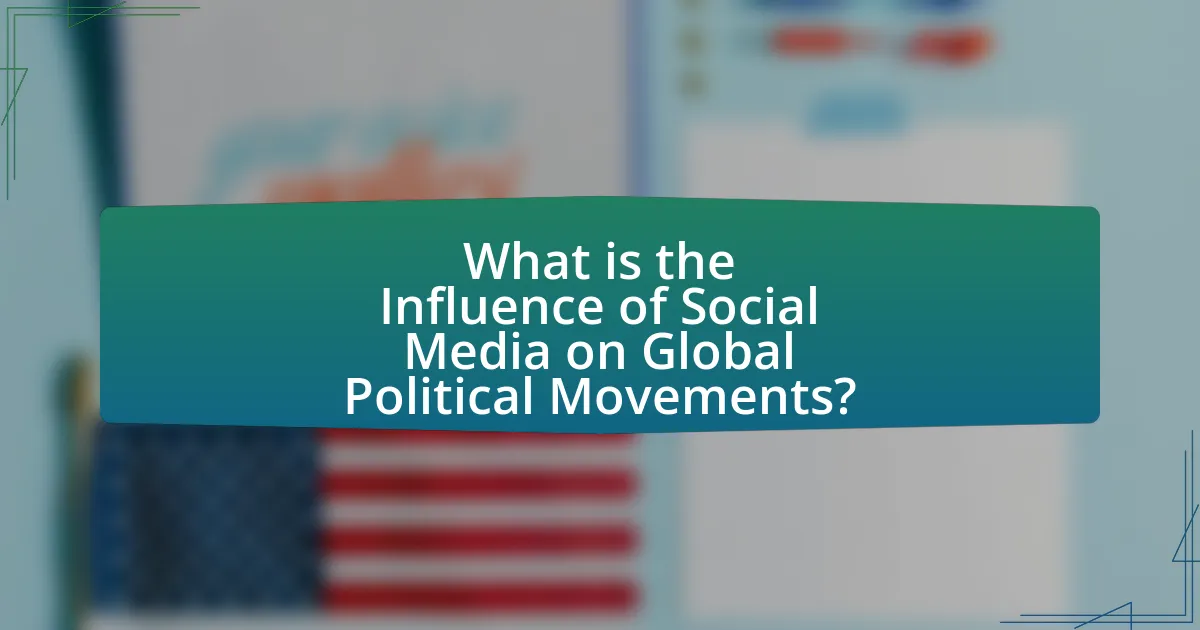
What is the Influence of Social Media on Global Political Movements?
Social media significantly influences global political movements by facilitating rapid communication, mobilization, and organization among activists. Platforms like Twitter and Facebook enable users to share information instantly, allowing movements to gain visibility and support across borders. For instance, during the Arab Spring, social media was instrumental in organizing protests and disseminating information, leading to widespread political change in countries like Tunisia and Egypt. Research by the Pew Research Center indicates that 66% of social media users in the Middle East reported using these platforms to engage in political discussions, highlighting their role in shaping public opinion and political action.
How has social media changed the landscape of political activism?
Social media has transformed political activism by enabling rapid information dissemination and facilitating grassroots mobilization. Platforms like Twitter and Facebook allow activists to share messages instantly, reaching a global audience and fostering real-time engagement. For instance, during the Arab Spring in 2011, social media played a crucial role in organizing protests and spreading awareness, leading to significant political changes in several countries. Additionally, studies show that social media campaigns can increase participation in political movements; for example, a 2018 study published in the Journal of Communication found that social media use significantly correlated with higher levels of political engagement among young voters. This shift has democratized the political landscape, allowing marginalized voices to be heard and mobilized more effectively than traditional methods.
What role do platforms like Twitter and Facebook play in mobilizing movements?
Platforms like Twitter and Facebook serve as critical tools for mobilizing movements by facilitating rapid communication and information dissemination among users. These platforms enable activists to organize events, share updates, and rally support, often leading to increased visibility and participation in social movements. For instance, during the Arab Spring, Twitter was instrumental in coordinating protests and sharing real-time information, which significantly contributed to the movements’ momentum and global awareness. Additionally, studies have shown that social media can amplify messages, allowing grassroots movements to reach wider audiences and attract international attention, thereby enhancing their impact and effectiveness.
How do hashtags and trends contribute to political awareness?
Hashtags and trends significantly enhance political awareness by facilitating the rapid dissemination of information and mobilizing public discourse. They serve as focal points for conversations around specific issues, allowing users to easily access and engage with relevant content. For instance, during the Arab Spring, hashtags like #Jan25 became pivotal in organizing protests and spreading awareness about political oppression, demonstrating how social media can amplify voices and catalyze movements. Research indicates that hashtags can increase engagement and visibility, leading to greater public participation in political discussions, as evidenced by the rise of movements such as #BlackLivesMatter, which has raised awareness about racial injustice and police brutality globally.
Why is social media considered a double-edged sword in politics?
Social media is considered a double-edged sword in politics because it facilitates both the mobilization of political movements and the spread of misinformation. On one hand, platforms like Twitter and Facebook enable rapid communication and organization among activists, as seen during the Arab Spring, where social media played a crucial role in coordinating protests and raising awareness. On the other hand, these same platforms can amplify false narratives and divisive content, leading to polarization and undermining democratic processes, as evidenced by the spread of misinformation during the 2016 U.S. presidential election. This dual capacity for positive engagement and harmful disruption illustrates why social media’s impact on politics is complex and multifaceted.
What are the positive impacts of social media on political movements?
Social media positively impacts political movements by enhancing communication, mobilizing supporters, and increasing awareness. It allows activists to disseminate information rapidly, facilitating real-time updates and coordination during protests, as seen in the Arab Spring where platforms like Twitter and Facebook played crucial roles in organizing demonstrations. Additionally, social media amplifies marginalized voices, enabling grassroots movements to gain visibility and support, exemplified by the #BlackLivesMatter movement, which utilized social media to raise awareness about racial injustice and mobilize protests globally. Furthermore, social media fosters community building among like-minded individuals, creating networks that strengthen collective action and advocacy efforts.
What are the negative consequences of social media in political contexts?
Social media can lead to significant negative consequences in political contexts, including the spread of misinformation, polarization of public opinion, and the facilitation of extremist ideologies. Misinformation can rapidly circulate on platforms, influencing voter perceptions and decisions; for instance, a study by the Pew Research Center found that 64% of Americans believe fabricated news stories cause confusion about the basic facts of current events. Additionally, social media often creates echo chambers, where users are exposed primarily to viewpoints that reinforce their own beliefs, contributing to societal polarization. Research published in the journal “Nature” indicates that exposure to extreme political content can increase partisan hostility. Furthermore, social media can provide a platform for extremist groups to recruit and organize, as evidenced by the rise of radical movements that have utilized these platforms for mobilization.
How do different demographics engage with social media for political purposes?
Different demographics engage with social media for political purposes in varied ways, influenced by factors such as age, education, and socio-economic status. For instance, younger individuals, particularly those aged 18-29, are more likely to use platforms like Instagram and TikTok to express political opinions and mobilize for causes, as evidenced by the 2020 U.S. elections where 50% of this age group reported using social media for political engagement (Pew Research Center). In contrast, older demographics, such as those over 50, tend to favor Facebook for political discussions and information sharing, reflecting their established online habits. Additionally, individuals with higher education levels are more likely to engage in political discourse on social media, as they often seek out and share information related to political issues, which is supported by studies indicating that educated users are more active in online political communities. Thus, demographic factors significantly shape how individuals utilize social media for political engagement.
What are the differences in social media usage among various age groups?
Younger age groups, particularly those aged 18-29, predominantly use social media platforms like Instagram, Snapchat, and TikTok for communication and entertainment, while older age groups, such as those aged 30-49, tend to favor Facebook and LinkedIn for networking and information sharing. According to the Pew Research Center, 84% of adults aged 18-29 use social media, compared to 70% of those aged 30-49 and 50% of adults aged 50 and older. Additionally, older users often engage with social media for news consumption, whereas younger users are more inclined to use it for social interaction and entertainment. This generational divide highlights distinct preferences and purposes in social media usage across age groups.
How do cultural factors influence social media’s role in political movements?
Cultural factors significantly influence social media’s role in political movements by shaping the narratives, values, and communication styles that resonate with specific audiences. For instance, in cultures with a strong emphasis on collectivism, social media platforms often serve as tools for community mobilization and collective action, as seen during the Arab Spring, where shared cultural values of unity and resistance were amplified through platforms like Facebook and Twitter. Additionally, cultural norms regarding authority and dissent can dictate how individuals engage with political content online; in more authoritarian cultures, social media may be used cautiously to avoid repercussions, while in more liberal societies, it can foster open debate and activism. This dynamic interplay illustrates that the effectiveness of social media in political movements is not merely a function of technology but is deeply rooted in the cultural context in which it operates.
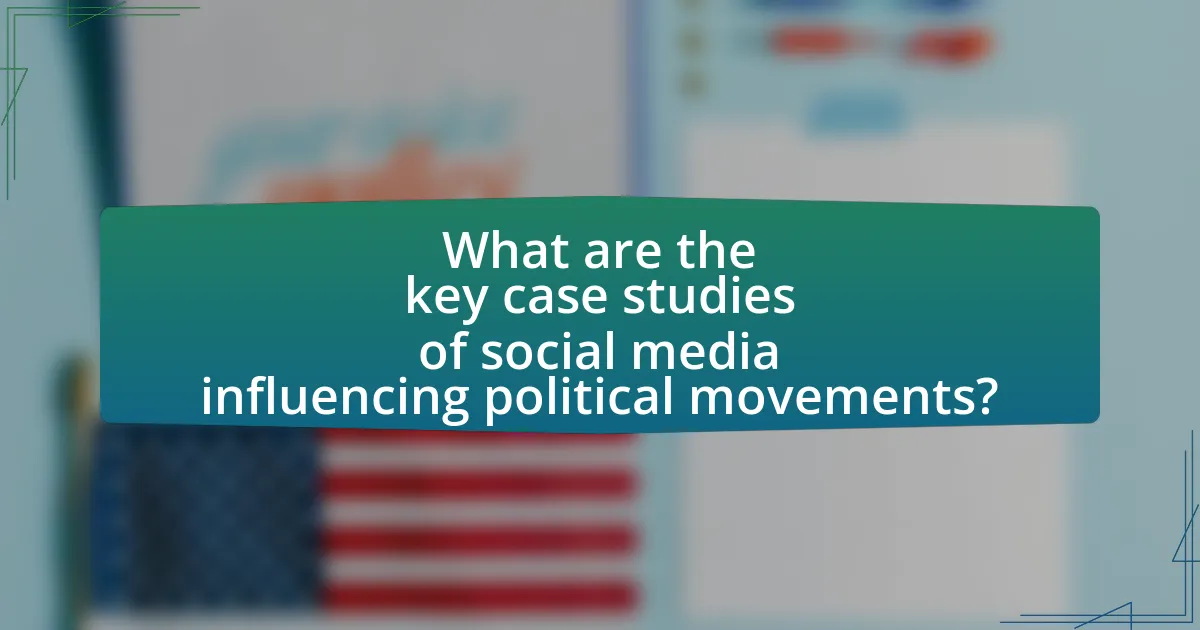
What are the key case studies of social media influencing political movements?
Key case studies of social media influencing political movements include the Arab Spring, the Black Lives Matter movement, and the 2016 U.S. presidential election. The Arab Spring, which began in 2010, saw platforms like Facebook and Twitter used to organize protests against authoritarian regimes in countries such as Tunisia and Egypt, leading to significant political changes. The Black Lives Matter movement, which gained traction in 2013, utilized social media to raise awareness about racial injustice and mobilize protests across the United States and globally, significantly impacting public discourse and policy. In the 2016 U.S. presidential election, social media played a crucial role in shaping voter opinions and facilitating campaign strategies, with platforms being used for targeted advertising and grassroots mobilization, ultimately influencing the election outcome. These examples illustrate the powerful role social media plays in modern political movements, enabling rapid communication and organization.
How did social media contribute to the Arab Spring?
Social media significantly contributed to the Arab Spring by facilitating communication, organization, and mobilization among protesters. Platforms like Facebook and Twitter enabled activists to share information rapidly, coordinate protests, and raise awareness about government oppression. For instance, the use of Facebook to organize the January 25, 2011, protests in Egypt exemplifies this impact, as it allowed thousands to gather in Tahrir Square, leading to the eventual ousting of President Hosni Mubarak. Additionally, social media provided a means for citizens to document and broadcast events in real-time, which garnered international attention and support, further amplifying the movement’s reach and influence.
What specific platforms were most effective during the Arab Spring?
The specific platforms that were most effective during the Arab Spring include Facebook, Twitter, and YouTube. Facebook served as a primary tool for organizing protests and sharing information, with millions of users in the region facilitating rapid communication. Twitter played a crucial role in real-time updates and mobilization, allowing activists to disseminate information quickly and connect with a global audience. YouTube was instrumental in broadcasting events and documenting human rights abuses, which garnered international attention and support. These platforms collectively enabled grassroots movements, as evidenced by the significant role they played in the uprisings in Tunisia, Egypt, and Libya, where social media was pivotal in rallying support and spreading awareness.
What lessons were learned from the Arab Spring regarding social media’s role?
The Arab Spring demonstrated that social media can serve as a powerful tool for mobilization and information dissemination in political movements. It facilitated rapid communication among activists, enabling them to organize protests and share real-time updates, which was evident during the 2011 protests in Tunisia and Egypt. Social media platforms like Facebook and Twitter played crucial roles in spreading awareness and garnering international support, as seen when hashtags like #Jan25 became rallying cries for demonstrators. Additionally, the Arab Spring highlighted the dual nature of social media, as it can also be used by governments for surveillance and propaganda, underscoring the need for digital security among activists.
What impact did social media have on the Black Lives Matter movement?
Social media significantly amplified the Black Lives Matter movement by facilitating rapid information dissemination and mobilization of supporters. Platforms like Twitter and Facebook enabled activists to share real-time updates, organize protests, and raise awareness about racial injustices, particularly following high-profile incidents of police violence. For instance, the hashtag #BlackLivesMatter gained traction after the 2014 killing of Michael Brown, leading to widespread protests across the United States and globally. Research by the Pew Research Center indicates that social media played a crucial role in engaging younger demographics, with 70% of young adults using these platforms to express their views on social issues. This engagement not only increased visibility for the movement but also fostered a sense of community among activists, allowing for coordinated efforts and support across different regions.
How did social media facilitate global solidarity for the movement?
Social media facilitated global solidarity for the movement by enabling rapid information sharing and fostering connections among diverse groups. Platforms like Twitter and Facebook allowed activists to disseminate messages, organize events, and mobilize support across borders, exemplified by the use of hashtags such as #BlackLivesMatter and #MeToo, which united individuals worldwide around common causes. Research indicates that social media campaigns can increase awareness and engagement, as seen in the Arab Spring, where online platforms played a crucial role in coordinating protests and spreading revolutionary ideas.
What strategies were employed on social media to raise awareness?
Social media platforms employed various strategies to raise awareness, including targeted campaigns, hashtag movements, and influencer partnerships. Targeted campaigns utilized data analytics to reach specific demographics, ensuring that messages resonated with the intended audience. Hashtag movements, such as #BlackLivesMatter, created a unified message that spread rapidly, facilitating global conversations and mobilizing support. Influencer partnerships leveraged the reach of popular figures to amplify messages, increasing visibility and engagement. These strategies collectively enhanced the ability of social movements to communicate their goals and rally support effectively.
How has social media influenced recent elections around the world?
Social media has significantly influenced recent elections around the world by shaping public opinion, facilitating political mobilization, and enabling targeted advertising. For instance, during the 2020 U.S. presidential election, platforms like Facebook and Twitter played crucial roles in disseminating information and misinformation, impacting voter perceptions and behaviors. Research from the Pew Research Center indicates that 53% of U.S. adults reported getting news from social media, highlighting its role as a primary information source. Additionally, in the 2019 Indian general elections, political parties utilized WhatsApp to reach millions of voters directly, demonstrating social media’s capacity for grassroots mobilization. These examples illustrate how social media has transformed electoral dynamics globally, affecting both the strategies of political campaigns and the engagement of voters.
What role did social media play in the 2020 U.S. Presidential Election?
Social media played a crucial role in the 2020 U.S. Presidential Election by serving as a primary platform for political communication, campaigning, and voter mobilization. Candidates utilized platforms like Twitter, Facebook, and Instagram to reach millions of voters directly, bypassing traditional media channels. For instance, Joe Biden’s campaign focused heavily on digital outreach, resulting in over 100 million interactions on social media, while Donald Trump’s campaign leveraged his established online presence to engage supporters and disseminate messages rapidly. Additionally, social media was instrumental in shaping public discourse, with platforms being used to spread information, misinformation, and mobilize grassroots movements, as evidenced by the significant increase in voter turnout, which reached 66.8% of the eligible population, the highest for a presidential election in the U.S. since 1900.
How do misinformation and disinformation campaigns affect electoral outcomes?
Misinformation and disinformation campaigns significantly distort electoral outcomes by manipulating public perception and voter behavior. These campaigns can lead to the spread of false narratives that misinform voters about candidates, policies, or electoral processes, ultimately influencing their decisions at the polls. For instance, a study by the Oxford Internet Institute found that misinformation on social media platforms can sway public opinion and increase polarization, which can alter the dynamics of electoral contests. Additionally, the 2016 U.S. presidential election demonstrated how targeted disinformation campaigns, particularly on platforms like Facebook and Twitter, affected voter turnout and preferences, with reports indicating that misleading information reached millions of users.
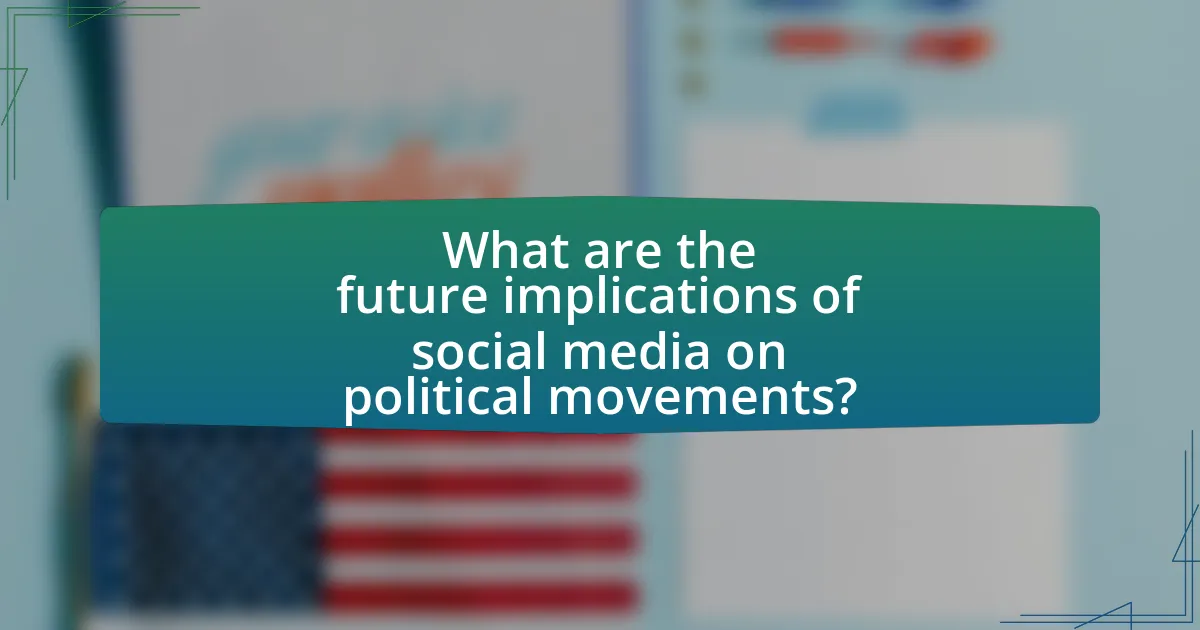
What are the future implications of social media on political movements?
Social media will increasingly shape political movements by facilitating rapid information dissemination and mobilization. As platforms evolve, they will enhance the ability of grassroots organizations to organize protests and campaigns, as seen in movements like the Arab Spring, where social media played a crucial role in coordinating actions and spreading awareness. Furthermore, the rise of algorithms that prioritize engagement may amplify extremist views, potentially polarizing political discourse and leading to increased social unrest. Research indicates that social media can influence public opinion and voter behavior, as demonstrated in studies analyzing the impact of targeted political ads on platforms like Facebook during elections. Thus, the future implications of social media on political movements include both empowering activists and posing challenges to democratic processes.
How might emerging technologies change the way social media influences politics?
Emerging technologies, such as artificial intelligence and blockchain, may significantly alter the influence of social media on politics by enhancing data analysis and ensuring transparency. AI can analyze vast amounts of social media data to identify trends, sentiments, and voter behavior, allowing political campaigns to tailor their strategies more effectively. For instance, during the 2020 U.S. elections, AI-driven tools were used to optimize ad targeting based on user engagement patterns. Additionally, blockchain technology can provide a secure and transparent way to verify information shared on social media, potentially reducing the spread of misinformation that can sway public opinion. A study by the Pew Research Center found that 64% of Americans believe misinformation has a major impact on political outcomes, highlighting the need for technological solutions to address this issue.
What role will artificial intelligence play in shaping political discourse on social media?
Artificial intelligence will significantly shape political discourse on social media by enhancing content personalization, automating moderation, and influencing information dissemination. AI algorithms analyze user behavior and preferences, allowing platforms to tailor political content to individual users, which can amplify echo chambers and polarize opinions. For instance, a study by the Pew Research Center found that 64% of Americans believe social media has a mostly negative effect on the way things are going in the country, highlighting concerns about the impact of AI-driven content curation on public perception. Additionally, AI tools are employed for moderating harmful content, which can affect the visibility of political messages, either suppressing dissenting voices or promoting specific narratives. This dual role of AI in both personalization and moderation underscores its profound influence on political discourse in the digital age.
How could virtual reality and augmented reality impact political engagement?
Virtual reality (VR) and augmented reality (AR) could significantly enhance political engagement by creating immersive experiences that allow users to interact with political content in a more engaging manner. These technologies enable individuals to visualize complex political issues, participate in virtual town halls, and experience simulations of political scenarios, which can lead to a deeper understanding of the political landscape. For instance, a study by the Stanford Virtual Human Interaction Lab found that VR can increase empathy and understanding of social issues, suggesting that immersive experiences can motivate individuals to become more politically active. Additionally, AR applications can provide real-time information during political events, enhancing the ability of citizens to engage with and respond to political discourse.
What strategies can activists use to effectively leverage social media?
Activists can effectively leverage social media by utilizing targeted messaging, engaging storytelling, and strategic partnerships. Targeted messaging allows activists to reach specific demographics, increasing the likelihood of engagement; for instance, campaigns like #BlackLivesMatter have successfully tailored messages to resonate with younger audiences on platforms like Twitter and Instagram. Engaging storytelling captures attention and fosters emotional connections, as seen in the viral spread of videos highlighting social injustices, which mobilize support and action. Strategic partnerships with influencers and organizations amplify reach and credibility; for example, the collaboration between climate activists and celebrities has significantly raised awareness and participation in environmental movements. These strategies demonstrate the power of social media in mobilizing support and driving change in global political movements.
How can movements combat misinformation on social media platforms?
Movements can combat misinformation on social media platforms by implementing fact-checking initiatives and promoting media literacy among their followers. Fact-checking initiatives involve verifying claims and providing accurate information to counter false narratives, which has been shown to reduce the spread of misinformation. For instance, organizations like the International Fact-Checking Network have successfully collaborated with social media platforms to flag false content and provide reliable sources. Additionally, promoting media literacy equips individuals with the skills to critically evaluate information, thereby decreasing susceptibility to misinformation. Research indicates that media literacy programs can significantly enhance users’ ability to discern credible information from falsehoods, ultimately fostering a more informed public discourse.
What best practices should be followed for effective online activism?
Effective online activism requires clear messaging, strategic use of social media platforms, and community engagement. Clear messaging ensures that the cause is easily understood and resonates with a broad audience, which is crucial for mobilizing support. Strategic use of social media platforms involves selecting the right channels to reach target demographics, utilizing hashtags for visibility, and timing posts for maximum engagement. Community engagement fosters a sense of belonging and encourages participation, which can be achieved through interactive content, live discussions, and collaborative campaigns. Research indicates that campaigns with strong community involvement, such as the Ice Bucket Challenge, can significantly increase awareness and donations, demonstrating the effectiveness of these best practices in driving impactful online activism.
What are the ethical considerations surrounding social media and political movements?
The ethical considerations surrounding social media and political movements include issues of misinformation, privacy, and the potential for manipulation. Misinformation can spread rapidly on social media platforms, leading to misinformed public opinion and potentially harmful actions, as seen during events like the Arab Spring where false narratives influenced protests. Privacy concerns arise when personal data is harvested and used for targeted political advertising, raising questions about consent and the right to privacy. Additionally, the manipulation of algorithms can create echo chambers, reinforcing biases and polarizing societies, which has been documented in studies examining the impact of social media on electoral outcomes. These ethical dilemmas highlight the need for responsible use of social media in political contexts.
How can privacy concerns be addressed in the context of political activism?
Privacy concerns in political activism can be addressed by implementing strong encryption methods for communication and utilizing privacy-focused platforms. These measures protect activists’ identities and sensitive information from surveillance and data breaches. For instance, the use of end-to-end encryption in messaging apps like Signal ensures that only the intended recipients can access the content of conversations, thereby safeguarding against unauthorized access. Additionally, employing decentralized social media platforms can reduce the risk of data harvesting by corporations and governments, as seen with platforms like Mastodon. These strategies are essential for maintaining the safety and anonymity of activists, particularly in oppressive regimes where surveillance is prevalent.
What responsibilities do social media companies have in moderating political content?
Social media companies have the responsibility to ensure that political content on their platforms adheres to community guidelines and legal standards. This includes moderating misinformation, hate speech, and incitement to violence, as these can significantly impact public opinion and democratic processes. For instance, the 2020 U.S. presidential election highlighted the role of platforms like Facebook and Twitter in combating false narratives, leading to the implementation of fact-checking measures and content removal policies. Research by the Pew Research Center indicates that 64% of Americans believe social media companies should take a more active role in regulating political content. Thus, these companies must balance free expression with the need to protect users and maintain the integrity of political discourse.
